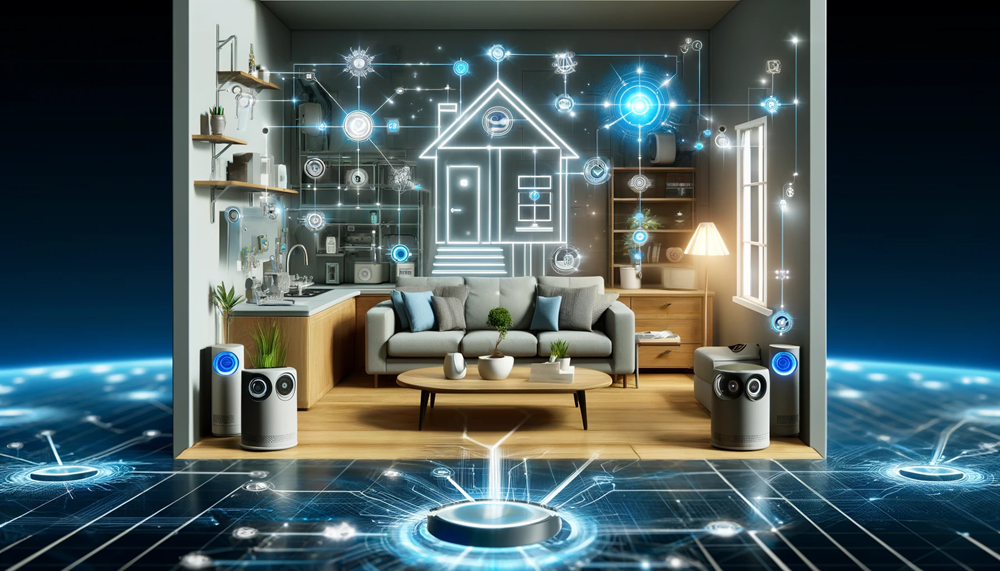Smart home technology has come a long way from simple voice-controlled devices to fully integrated ecosystems that enhance convenience, efficiency, and sustainability. In 2025, innovation is the driving force behind this transformation, introducing smarter, more connected, and user-centric solutions. From AI-powered automation to sustainable energy management, let’s explore how innovation is advancing smart home technology and reshaping modern living.
AI-Driven Personalization
Artificial intelligence (AI) is at the core of smart home advancements in 2025. Modern smart homes leverage AI to learn user preferences, predict behaviors, and automate daily tasks, creating a truly personalized experience.
Key Applications:
- Predictive Automation: AI-powered systems adjust lighting, temperature, and music based on the homeowner’s habits.
- Voice Assistants 2.0: Devices like Alexa and Google Assistant now offer contextual responses, enabling deeper interactions.
- Health Monitoring: AI-integrated wearables connect with smart home systems to adjust environmental factors like lighting and air quality for better well-being.
Why It Matters:
AI-driven personalization turns smart homes into intuitive spaces that adapt to the user’s needs, saving time and improving comfort.
Interoperability Through the Matter Standard
In 2025, the Matter standard has revolutionized device compatibility, allowing gadgets from different brands to work seamlessly together. This innovation eliminates the frustration of fragmented ecosystems.
Key Features:
- Universal Compatibility: Devices from Apple, Google, Amazon, and other brands communicate effortlessly.
- Simplified Setup: Easy onboarding and management of devices through a unified app.
- Future-Proofing: Ensures new devices integrate seamlessly with existing ecosystems.
Why It Matters:
The Matter standard simplifies the smart home experience, ensuring users can mix and match devices without compatibility concerns.
Sustainability and Energy Efficiency
Smart homes are becoming greener in 2025, with innovations focusing on reducing energy consumption and promoting sustainability. Homeowners now have access to tools that optimize resource use without sacrificing comfort.
Innovations:
- Smart Energy Grids: Connected homes communicate with energy providers to use electricity during off-peak hours, reducing costs and strain on the grid.
- Solar Integration: Smart home systems integrate seamlessly with solar panels and battery storage for efficient energy management.
- Eco-Modes: Devices like smart thermostats and washing machines feature eco-friendly settings for minimal energy usage.
Why It Matters:
Sustainability-focused smart homes reduce carbon footprints while offering long-term cost savings for homeowners.
Advanced Security and Privacy
Security and privacy remain top priorities for smart home innovation in 2025. Advanced systems are leveraging AI and blockchain technology to provide robust protection against cyber threats and unauthorized access.
Key Advancements:
- AI-Powered Security Cameras: Real-time threat detection with facial and motion recognition capabilities.
- Biometric Access Controls: Fingerprint and facial recognition ensure secure access to homes.
- Blockchain for Data Security: Decentralized systems protect user data from breaches and unauthorized access.
Why It Matters:
Enhanced security measures ensure peace of mind for users, protecting both physical assets and sensitive personal data.
Immersive Entertainment and Connectivity
Smart homes are transforming entertainment experiences with advanced connectivity and immersive technologies. High-speed internet, coupled with 5G and Wi-Fi 6, ensures seamless streaming, gaming, and communication.
Key Features:
- Whole-Home Audio Systems: AI-syncing speakers deliver personalized playlists in every room.
- AR and VR Integration: Augmented and virtual reality systems provide immersive gaming and cinema-like experiences.
- Multi-Device Connectivity: Streamlined control of TVs, gaming consoles, and smart projectors through a single interface.
Why It Matters:
Enhanced entertainment options cater to diverse needs, ensuring every family member enjoys a tailored experience.
Health-Focused Innovations
Health-centric smart home technology is booming in 2025, offering solutions that monitor and improve well-being. These innovations are particularly beneficial for aging populations and individuals with chronic conditions.
Innovations:
- Smart Air Quality Monitors: Real-time monitoring and purification of indoor air to reduce allergens and pollutants.
- Telemedicine Integration: Smart homes connect to telehealth platforms, allowing virtual doctor consultations.
- Fall Detection Systems: AI-enabled sensors detect falls and alert emergency services automatically.
Why It Matters:
Health-focused smart homes empower individuals to take control of their health while enhancing safety and convenience.
Robotics in Smart Homes
Robotics is playing an increasingly significant role in 2025’s smart homes, handling tasks ranging from cleaning to elder care. These devices are becoming smarter, more efficient, and more affordable.
Examples:
- AI-Powered Cleaning Robots: Advanced vacuum and mopping robots adapt to room layouts and clean autonomously.
- Home Assistants: Robots equipped with AI help with daily tasks, such as organizing schedules and managing groceries.
- Companion Robots: Designed to offer social interaction and companionship for elderly or isolated individuals.
Why It Matters:
Robotics adds convenience and improves the quality of life, especially for busy families and those requiring additional support.
Predictive Maintenance and Smart Appliances
Predictive maintenance is redefining appliance reliability by using AI to detect potential issues before they become costly repairs. This innovation extends the lifespan of home devices while minimizing downtime.
Features:
- Real-Time Monitoring: Sensors track the performance of appliances like HVAC systems and refrigerators.
- Maintenance Alerts: Notifies homeowners when servicing is needed.
- Energy Optimization: Ensures appliances operate at peak efficiency.
Why It Matters:
Predictive maintenance saves time and money while ensuring a hassle-free smart home experience.
The Smart Home Revolution
In 2025, smart home technology is more than just a convenience—it’s a lifestyle transformation powered by innovation. From AI-driven personalization and sustainability to advanced security and immersive entertainment, these technologies are making homes smarter, greener, and safer. As the pace of innovation accelerates, smart homes will continue to evolve, shaping the future of modern living.
